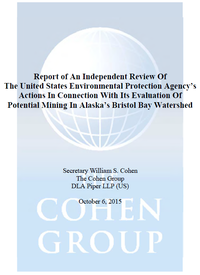- October 7, 2015
- in Green Tips
- by marcos
- 544
- 0

It’s easy to understand why the cash-starved Pebble Partnership, now just a single small Canadian exploration company called Northern Dynasty Minerals, would hire former Defense Secretary William Cohen to review EPA’s proposed restriction of Pebble’s planned massive copper and gold mine in Alaska’s Bristol Bay region — and then try to pass that review off as
But it’s harder to understand why the media would treat this transparent sham of an “independent review” as legitimate – or, for that matter, why Cohen would attach his substantial reputation to it. In his press release and report, he repeatedly emphasizes the word “independent” as if its numbing recitation might magically serve as a kind of invisibility cloak over the mountain of cash that Pebble paid him and his firm to join its choir.
Does he need the money or the work? I don’t know.
Does he care that his client’s massive mine, estimated to produce 10 billion tons of mining waste laced with toxics, threatens to contaminate one of the world’s great wild salmon fisheries – the annual $1.5 billion Bristol Bay wild salmon fishery– and with it the livelihood and sustenance of the people who live there? Does he care that the scheme is opposed by over 80% in the region and 65% state-wide? Maybe not.
But this much is true:
In this time of global environmental crisis, it is dismaying to see a former Cabinet official of William Cohen’s stature trade on his reputation to validate a review that reads like a press release of the company that hired him – a company whose reckless mining project poses risks that are, according to EPA, potentially “catastrophic” to the fishery and to the region.
Photo Cred: Robert Glenn Ketchum
Cohen claims to have interviewed 60 people, but he never says whom he actually interviewed, how many more refused to talk with him (other than EPA and its staff), or whose testimony led him ultimately to the unsurprising conclusion that his client is right. In his “independent” judgment, after an undefined interview process of unspecified individuals, Cohen concludes that EPA’s four-year scientific review process – twice peer-reviewed, repeatedly subjected to public comment, and steadfastly opposed (and frequently critiqued) by his client – was flawed and, further, that the agency’s proposed restriction of his client’s reckless project is neither “fair” nor “appropriate.”
Under the circumstances, it’s reasonable to ask what Cohen’s review adds to the record of opposition to EPA that his client has already created – why his judgment that EPA is unfairly victimizing his client even matters, except perhaps as a public relations stunt to be pitched to the media. If there is a legal basis to challenge EPA’s statutory authority under section 404(c) of the Clean Water Act with respect to the Pebble Mine – and Cohen never actually concludes that there is – then the proper recourse for Pebble, once a final decision has been made, is to pursue that challenge in the courts, like any other aggrieved stakeholder.
Again, Cohen’s opinion adds nothing to this well established right of judicial review.
And while he enthusiastically endorses as preferable the process of environmental review under the National Environmental Policy Act (NEPA) (even quoting NRDC), that separate statutory process attaches only once a permit application has been filed – something, he neglects to mention, that his client has promised but failed year after year to do despite expressions of impatience and frustration from Alaska Senator Lisa Murkowski and others. By contrast, EPA’s separate but rarely used 404(c) authority under the Clean Water Act can be exercised at any time (“whenever”) EPA finds that the statutory threshold for harm is met. In this case, that threshold has clearly been met, and EPA’s decision to act is reasonable.
Cohen expresses his hope that “policymakers involved in charting the course of the Bristol Bay watershed’s future will find this report helpful.” While the Pebble Partnership couldn’t have said it better, consider this: If one of Cohen’s formal, congressionally authorized actions had been challenged in this way when he was Secretary of Defense – by a lobbyist hired by a private party claiming that DOD had treated it unfairly – how would he have received it?
Cohen would certainly have ignored it. And that’s exactly what EPA – and the media – should do here.
— This feed and its contents are the property of The Huffington Post, and use is subject to our terms. It may be used for personal consumption, but may not be distributed on a website.


